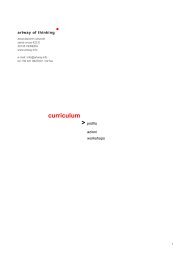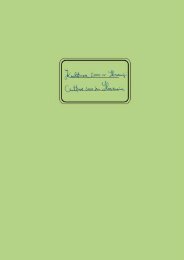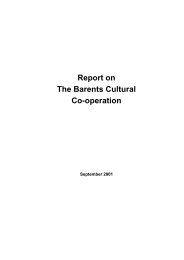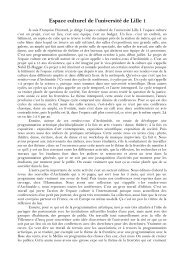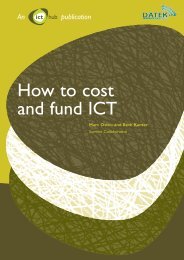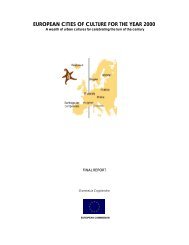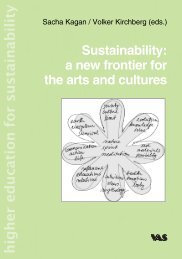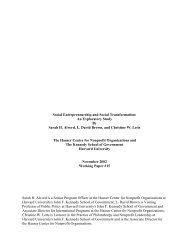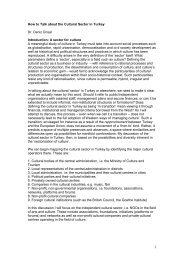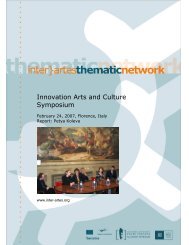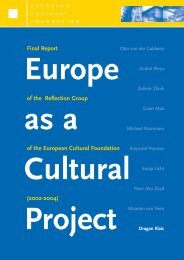A guide to the export and import of cultural goods between Russia ...
A guide to the export and import of cultural goods between Russia ...
A guide to the export and import of cultural goods between Russia ...
You also want an ePaper? Increase the reach of your titles
YUMPU automatically turns print PDFs into web optimized ePapers that Google loves.
Chapter 3: European Union Member States<br />
Italy<br />
Normally any object that is covered by <strong>the</strong> Italian Code (<strong>and</strong> it includes many categories <strong>of</strong><br />
<strong>cultural</strong> <strong>goods</strong>) will not get permission for permanent <strong>export</strong>, although it might get permission<br />
for temporary <strong>export</strong>.<br />
If you want <strong>to</strong> <strong>export</strong> <strong>the</strong> <strong>goods</strong> from Italy <strong>to</strong> <strong>Russia</strong>, you will also need an EU <strong>export</strong><br />
licence (provided <strong>the</strong>y come under <strong>the</strong> scope <strong>of</strong> Council Regulation 3911/92). You can<br />
apply for a temporary or a permanent <strong>export</strong> licence.<br />
What are my first steps? How do I plan this process <strong>and</strong> how long might it take?<br />
An application can be made by ei<strong>the</strong>r <strong>the</strong> owner or <strong>the</strong> caretaker <strong>of</strong> <strong>the</strong> object. You should<br />
apply <strong>to</strong> <strong>the</strong> Export Department at <strong>the</strong> Ministry for <strong>the</strong> Certificate <strong>of</strong> Circulation (in o<strong>the</strong>r<br />
words, for permission <strong>to</strong> <strong>export</strong>).<br />
To apply for a Certifi cate <strong>of</strong> Free Circulation (for permanent <strong>export</strong>), you must make<br />
a declaration <strong>of</strong> this intention <strong>and</strong> present <strong>the</strong> objects <strong>to</strong> <strong>the</strong> competent <strong>export</strong> <strong>of</strong>fi ce,<br />
indicating <strong>the</strong> market value. Within three days, <strong>the</strong> <strong>export</strong> <strong>of</strong>fi ce notifi es <strong>the</strong> Ministry<br />
who have ten days <strong>to</strong> respond with any additional information. Once <strong>the</strong> value has<br />
been established as fair, <strong>the</strong> Ministry’s Export Department must issue or refuse a<br />
Certifi cate <strong>of</strong> Free Circulation within 40 days <strong>of</strong> <strong>the</strong> initial application. The Certifi cate<br />
is valid for three years.<br />
A similar procedure applies when you apply for a Certifi cate <strong>of</strong> Temporary Circulation.<br />
The application must also include information on who is responsible for <strong>the</strong> safekeeping<br />
<strong>of</strong> <strong>the</strong> object while it is abroad. The timing for delivery <strong>of</strong> <strong>the</strong> certifi cate is <strong>the</strong> same<br />
but it is valid for a maximum <strong>of</strong> 18 months. The granting <strong>of</strong> a Certifi cate <strong>of</strong> Temporary<br />
Circulation is conditional on <strong>the</strong> property being insured by <strong>the</strong> applicant. For exhibitions<br />
<strong>and</strong> events promoted abroad by <strong>the</strong> Ministry or by o<strong>the</strong>r government bodies,<br />
Italian Cultural Institutes or supra-national bodies, <strong>the</strong> insurance may be assumed<br />
under State risks.<br />
There are specific regulations for works <strong>of</strong> art by artists who are deceased. In general,<br />
works <strong>of</strong> art over 50 years old are covered by <strong>the</strong> Code. If, however, <strong>the</strong> artist has died,<br />
any work by this artist (whenever it was created) can come under <strong>the</strong> Code if <strong>the</strong> artist’s<br />
production was for more than 50 years (i.e. <strong>the</strong>ir artistic career was at least 50 years long).<br />
In this case, <strong>the</strong> works are deemed <strong>to</strong> be “<strong>of</strong> <strong>cultural</strong> interest” <strong>and</strong> <strong>export</strong> will be restricted<br />
as with o<strong>the</strong>r older <strong>cultural</strong> <strong>goods</strong>.<br />
Applications for EU <strong>export</strong> licences should be made <strong>to</strong> <strong>the</strong> Ministry or via <strong>the</strong> regional<br />
Soprintendenze <strong>of</strong>fices which are also authorised <strong>to</strong> issue EU <strong>export</strong> licences. You<br />
should follow <strong>the</strong> procedure established under <strong>the</strong> Council Regulation 3911/92. EU <strong>export</strong><br />
licences can be issued at <strong>the</strong> same time as a Certificate <strong>of</strong> Free Circulation or not<br />
longer than 30 months after a Certificate has been granted. The EU <strong>export</strong> licence is<br />
valid for six months.<br />
It takes 15–40 days <strong>to</strong> issue an <strong>export</strong> licence.<br />
129



